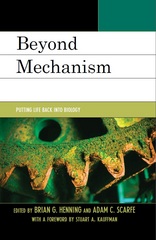Beyond Mechanism
 Brian G. Henning and Adam C. Scarfe (eds.)
Brian G. Henning and Adam C. Scarfe (eds.)Foreword by Stuart A. Kauffman
Lexington Books/Rowman & Littlefield 2013
Re-released in paperback 2015
Publisher's website
Amazon.com
Book Description
It has been said that new discoveries and developments in the human, social, and natural sciences hang “in the air” prior to their consummation. While neo-Darwinist biology has been powerfully served by its mechanistic metaphysic and a reductionist methodology in which living organisms are considered machines, many of the chapters in this volume place this paradigm into question. Pairing scientists and philosophers together, Beyond Mechanism: Putting Life Back into Biology explores what might be termed “the new frontiers” of biology, namely contemporary areas of research that invite an updating, a supplementation, or a relaxation of some of the main tenets of the modern synthesis. Such areas of investigation include: emergence theory, systems biology, biosemiotics, homeostasis, symbiogenesis, niche construction, the theory of organic selection (also known as “the Baldwin Effect”), self-organization, teleodynamics, and epigenetics. Most of the chapters in this book offer critical reflections on the neo-Darwinist outlook and work to promote a novel synthesis that is open to both a greater degree of inclusivity and a more holistic orientation in the biological sciences.
List of Contributors
Lawrence Cahoone, Tyrone Cashman, Philip Clayton, Terrence Deacon, Gernot Falkner, Renate Falkner, Brian K. Hall, Brian G. Henning, Jesper Hoffmeyer, Stuart A. Kauffman, Spyridon Koutroufinis, Lynn Margulis, Michael Ruse, Dorion Sagan, Adam C. Scarfe, J. Scott Turner, Robert E. Ulanowicz, Bruce H. Weber
Endorsements
“Suspicion about the adequacy of mechanistic views of nature has lately become increasingly audible. Contributors to this uniformly excellent body of essays not only amplify this suspicion but also offer scientifically and intellectually sophisticated alternatives. I consider this book essential reading for anyone seriously interested in understanding biology in its relationship to other fields of scientific and philosophical inquiry.” —John F. Haught, Georgetown University
“This collection of papers explores some ways forward for biological science, out of its neo-Darwinian stasis and its mechanistic bonds. I recommend this volume to those willing to consider some of the possibilities emerging now within biological science.” —Stanley N. Salthe, Binghamton University
Reviews
"It is quite obvious that the period of neo-Darwinism as the dominant view is coming to its end. The turn that is taking place in the current decades has been called the epigenetic turn . . . , but in order to make a true difference, it should be the semiotic turn. This is because the epigenetic factor exists due to the agencies which interpret and thus are bringing the initial pieces of knowing (aliquid stat pro aliquo) into the world. . . . Open-mindedness is our hope. The work by Brian Henning and Adam Scarfe deserves much appreciation." (Biosemiotics (2014): 7:465-470)
"In many respects, this is a remarkable book that comes at a timely moment, both for theoretical biology and for the philosophy of biology. The book, edited by Brian Henning and Adam Scarfe, constitutes an excellent compendium of philosophical and scientific criticism against the neo-Darwinian ‘‘received view’’, in which Natural Selection is taken as the fundamental explanatory mechanism of biological evolution (and, indirectly, of biological phenomena in general). As an alternative, ‘‘Beyond Mechanism’’ not only presents a wide repertoire of arguments in defense of a more pluralistic view of evolution, but more importantly, it constitutes a piece of research into a new conceptual framework for biology. . . . Globally speaking, the set of chapters in this book constitute an excellent, profound and very comprehensive criticism of the reductionist traditions in biology, and a fascinating exploration of new alternatives."
(Science Education (2016))
Table of Contents
Foreword: Evolution beyond Newton, Darwin, and Entailing Law
Stuart A. Kauffman
Introduction: On a “Life-Blind Spot” in Neo-Darwinism’s Mechanistic Metaphysical Lens
Adam C. Scarfe
Section 1: Complexity, Systems Theory, and Emergence
1 Complex Systems Dynamics in Evolution and Emergent Processes
Bruce H. Weber
2 Why Emergence Matters
Philip Clayton
3 On the Incompatibility of the Neo-Darwinian Hypothesis With Systems-Theoretical Explanations of Biological Development
Gernot Falkner and Renate Falkner
4 Process-First Ontology
Robert E. Ulanowicz
5 Ordinal Pluralism as Metaphysics for Biology
Lawrence Cahoone
Section 2: Biosemiotics
6 Why Do We Need a Semiotic Understanding of Life?
Jesper Hoffmeyer
7 The Irreducibility of Life to Mentality: Biosemiotics or Emergence?
Lawrence Cahoone
Section 3: Homeostasis, Thermodynamics, and Symbiogenesis
8 Biology’s Second Law: Homeostasis, Purpose and Desire
J. Scott Turner
9 “Wind at Life’s Back”—Toward a Naturalistic, Whiteheadian Teleology: Symbiogenesis and the Second Law
Dorion Sagan and Lynn Margulis
10 Of Termites and Men: On the Ontology of Collective Individuals
Brian G. Henning
Section 4: The Baldwin Effect, Behavior, and Evolution
11 The Baldwin Effect in an Extended Evolutionary Synthesis
Bruce H. Weber
12 On the Ramifications of the Theory of Organic Selection for Environmental and Evolutionary Ethics
Adam C. Scarfe
Section 5: Autogen, Teleology, and Teleodynamics
13 Teleology versus Mechanism in Biology: Beyond Self-Organization
Terrence Deacon and Tyrone Cashman
14 Teleodynamics: A Neo-Naturalistic Conception of Organismic Teleology
Spyridon Koutroufinis
Section 6: Epigenetics
15 Epigenesis, Epigenetics, and the Epigenotype: Toward An Inclusive Concept of Development and Evolution
Brian K. Hall
16 Epigenetics, Soft Inheritance, Mechanistic Metaphysics, and Bioethics
Adam C. Scarfe
Section 7: Organism and Mechanism
17 From Organicism to Mechanism—and Halfway Back?
Michael Ruse
18 Machines and Organisms: The Rise and Fall of a Conflict
Philip Clayton